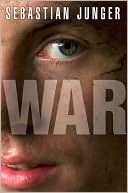More on this book
Community
Kindle Notes & Highlights
One moment he was in the first firefight of his life, the next moment he was dead.
“These subjects were action-oriented individuals who characteristically spent little time in introspection. Their response to any environmental threat was to engage in a furor of activity which rapidly dissipated the developing tension.”
an enormous amount of war-fighting simply consists of carrying heavy loads uphill.
Highly trained men in extraordinarily dangerous circumstances are less likely to break down than untrained men in little danger.
As a result, much of modern military tactics is geared toward maneuvering the enemy into a position where they can essentially be massacred from safety. It sounds dishonorable only if you imagine that modern war is about honor; it’s not. It’s about winning, which means killing the enemy on the most unequal terms possible. Anything less simply results in the loss of more of your own men.
Good soldiers died just as easily as sloppy ones, which is pretty much how soldiers define unfair tactics in war.
The trucks reduced war to a kind of grim dice game that was impossible to learn from or get good at; you just had to hope your luck lasted until it was time to go home.
Combat isn’t where you might die—though that does happen—it’s where you find out whether you get to keep on living. Don’t underestimate the power of that revelation. Don’t underestimate the things young men will wager in order to play that game one more time.
Combat theoretically gives you the chance to react well and survive; bombs don’t allow for anything.
Each Javelin round costs $80,000, and the idea that it’s fired by a guy who doesn’t make that in a year at a guy who doesn’t make that in a lifetime is somehow so outrageous it almost makes the war seem winnable.
There was no such thing as personal safety out there; what happened to you happened to everyone.
In the civilian world almost nothing has lasting consequences, so you can blunder through life in a kind of daze. You never have to take inventory of the things in your possession and you never have to calculate the ways in which mundane circumstances can play out—can, in fact, kill you. As a result, you lose a sense of the importance of things, the gravity of things. Back home mundane details also have the power to destroy you, but the cause and effect are often spread so far apart that you don’t even make the connection; at Restrepo, that connection was impossible to ignore.
everything fell apart once the fighting stopped. Friends started arguing and a sour discontent crept through the company that was almost as threatening to their mission as the enemy. The lull was much harder on group dynamics than combat and caught everyone by surprise, even the commanders.
Donoho would pretend to see obstacles on night patrols and climb over them so he could watch the next guy in line try to do the same thing.
You don’t want to be near the new guys in case they freeze or shoot so much they draw fire or jam their guns. You don’t want to be near the cowboys, either, or the guys who have to glance over at their team leader before they dare do anything. It’s subtle, what you want—I’m not sure there are even words for it—but at night on a frozen road outside an enemy village the choices you make reflect something real.
The coward’s fear of death stems in large part from his incapacity to love anything but his own body. The inability to participate in others’ lives stands in the way of his developing any inner resources sufficient to overcome the terror of death.
Religion gives a man enough courage to face the overwhelming, and there may have been so little religion at Restrepo because the men didn’t feel particularly overwhelmed. (Why appeal to God when you can call in Apaches?) You don’t haul your cook up there just so that he can be in his first firefight unless you’re pretty confident it’s going to end well. But even in the early days, when things were definitely not ending well, the nearly narcotic effect of a tightly knit group might have made faith superfluous. The platoon was the faith, a greater cause that, if you focused on it entirely, made
...more
Brostrom and Specialist Jason Hovater made it to the outpost and began fighting with the help of another specialist named Pruitt Rainey. They grabbed the 240 from Pitts—he was too badly wounded to use it—and moved to an adjacent fighting position. At one point a specialist named Stafford heard one of the men scream, “They’re inside the wire!” followed by a long burst of gunfire. Then, “He’s right behind the fucking sandbag!” and another burst. After that came silence, and Brostrom, Rainey, and Hovater were dead.
Within a couple of years most of the men in the platoon had either gotten married, divorced, or had a kid, and some managed to do all three.
Missing something as horrible as war is deeply confusing not just to the men themselves but to their wives, their families, their friends.
Brotherhood has nothing to do with feelings; it has to do with how you define your relationship to others. It has to do with the rather profound decision to put the welfare of the group above your personal welfare. In such a system, feelings are meaningless. In such a system, who you are entirely depends on your willingness to surrender who you are. Once you’ve experienced the psychological comfort of belonging to such a group, it’s apparently very hard to give it up.


